
Intelligent Automation - Quick Guide
Introduction to Intelligent Automation
Intelligent Automation, abbreviated as IA, is an advanced concept in business process automation that makes use of artificial intelligence (AI) and machine learning (ML) to automate and optimize workflows and processes, and it provides enhanced decision-making capabilities to achieve desired business objectives. Therefore, intelligent automation can be considered a modern solution for various business problems and challenges.
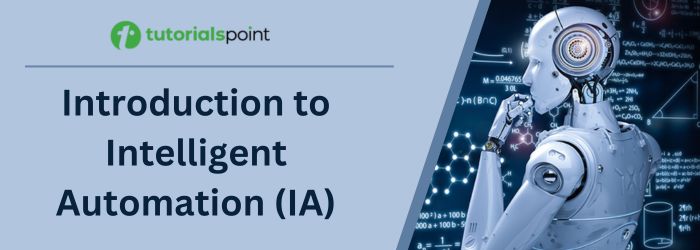
In this chapter, we will have a detailed discussion on fundamentals of intelligent automation and its significance in business process automation.
What is Intelligent Automation?
Intelligent Automation (IA) is a modern technology used for automating business processes and streamlining operations across organizations. It makes a combined use of various advanced technologies such as artificial intelligence (AI), machine learning (ML), robotic process automation (RPA), and business process management (BPM). These technologies together provide capabilities to make automation decisions cognitively, hence IA is also referred to as cognitive automation.
Most business organizations employ intelligent automation for following main purposes −
- Simplify and optimize processes and workflows
- Free up resources from low-value, repetitive tasks
- Improve operational efficiencies
- Reduce risks of human errors
- Speed up processes and operations
- Reduce costs, etc.
How Intelligent Automation Works?
Intelligent Automation uses multiple cognitive technologies such as AI, ML, process mining, RPA, BPM, etc. These tools together are capable in automating from simple business tasks to entire end-to-end processes within an organization.
Since, IA can perform cognitive decision-making, it eliminates the need for human workers in many tasks, so they can be engaged in more strategic and high-value activities.
By combining right technologies together, intelligent automation can automate highly complex tasks or processes as well. It also provides following capabilities to an organization −
- Allows to identify processes suitable for automation
- Provides data extraction facilities from data sets and organize them into customized formats
- Helps visualizing information
- Addresses problems and issues without need for human involvement
- Allows people, technology, and processes to share a workspace collaboratively, etc.
How Intelligent Automation is Different from RPA?
RPA (Robotic Process Automation) is an automation technology that uses software robots to perform low-value, rule-based, repetitive tasks within an organization. It provides basic automation facilities by simulating human actions. RPA does not have intelligence like humans; hence it can execute tasks and process data, but cannot interpret them.
On the other hand, Intelligent Automation performs tasks automatically like a human worker. This is possible because it uses multiple cognitive technologies like AI, ML, etc. combined with RPA. Therefore, IA can interpret data and handle the end-to-end processes independently.
Difference between Intelligent Automation and Robotic Process Automation
The following table provides a comparison of intelligent automation and robotic process automation by considering several important aspects −
| Aspect | Intelligent Automation | Robotic Process Automation |
|---|---|---|
| Function | Intelligent automation provides cognitive automation capabilities. | RPA is used to automate rule-based, repetitive tasks. |
| What it does? | Intelligent Automation simulates human intelligence in automation activities and provides enhanced automation and decision-making capabilities. | RPA simulates human actions to automatically execute simple tasks without any human intervention. |
| Data interpretation | Intelligent automation provides data interpretation capabilities and supports decision-making. | RPA can only download or move data, but incapable in interpreting it. Hence, it does not provide any support in decision-making. |
| Scope of automation | Intelligent automation can automate both structured and unstructured business processes. | The automation capabilities of RPA are limited to rule-based, repetitive tasks. |
| Technologies used | Intelligent automation uses AI, ML, BPM, and other cognitive technologies with RPA. | Software robots are key technological components of RPA. |
| Efficiency improvement | Intelligent automation optimizes entire processes and enhances efficiency to a significant level. | RPA reduces errors and increases efficiency in repetitive tasks. |
| Use cases | Intelligent automation is used to end-to-end automate processes and business operations. | RPA is mainly used to automate simple tasks like data entry, report generation, invoice processing, and file transfer. |
Eligible Processes for Intelligent Automation
Business processes that have the following characteristics are considered eligible for intelligent automation −
- Processes that involve the use of high volumes of data and multiple repetitive tasks are best suited to automate using intelligent automation.
- Processes in which rule-based decision-making is required for execution can be automated using intelligent automation.
- Intelligent automation can automate processes that involve manual data entry.
- Complex processes that use unstructured data can be automated using intelligent automation.
- Processes whose results required to be highly accurate and error-free are suitable for intelligent automation.
- Intelligent automation is also a valuable tool to automate time-consuming and time-critical processes.
Examples of Intelligent Automation
The following are some common examples of intelligent automation driving business excellence in various industries −
- Mortgage Cross-Selling − Banks and credit institutions use intelligent automation to analyze their customer data and determine opportunities of mortgage cross-selling.
- Employee Onboarding and Offboarding − Organizations also use intelligent automation in their HR department to streamline operations like paperwork and formalities related to onboarding and offboarding.
- Quote-to-Cash − Business organizations also utilize intelligent automation to automate billing, quoting, and payment operations. IA provides automated facilities to extract data from invoices and contract documents.
- Customer Relationship Management − Intelligent automation also helps to automate CRM operations like data entry, contact management, etc. It frees up sales employees to focus on customer interactions.
- Inventory Management − Intelligent automation can end-to-end automate supply chain operations, order tracking, and inventory control.
- Quality Management − Intelligent automation provides comprehensive data about performance and automates testing. This helps improving accuracy in quality management and reduces cost involved in quality control.
Conclusion
In this chapter, we provided an overview of intelligent automation concept, its working, and examples of real-life applications.
In conclusion, Intelligent Automation is a technology that transforms business processes and workflows by making use of artificial intelligence, machine learning, and many other cognitive technologies. It allows organizations to automate their repetitive tasks, end-to-end processes, and improves decision-making in business operations.
Components of Intelligent Automation
Intelligent Automation comprises of several components to cognitively automate business processes and workflows. This chapter is meant for explaining some of the main components of intelligent automation that help achieve necessary automation functionalities in business operations.
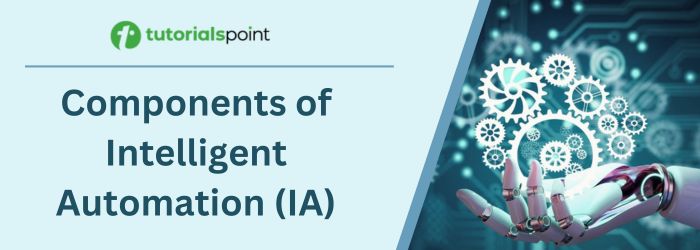
Intelligent Automation Components
The main components of intelligent automation are explained below with their basic introduction and role in intelligent automaton −
Artificial Intelligence (AI)
Artificial Intelligence (AI) is a modern technology that simulates human intelligence in machines. Hence, it makes computers and software capable in handling tasks and processes that require cognitive decision-making.
In intelligent automation, artificial intelligence provides capabilities to handle and automate complex workflows and processes. To solve critical problems and enhance operational efficiency, AI makes combined use of more advanced technologies like machine learning (ML), optical character recognition (OCR), and natural language processing (NLP). Thus, artificial intelligence makes intelligent automation more intelligent by enabling it to learn and improve from data.
AI offers several benefits to intelligent automation, such as speed up automation, adaptive to changes, optimize workflows, provide responses and supports dynamically, etc.
Robotic Process Automation (RPA)
Robotic Process Automation (RPA) is an automation technology used to automate rule-based, repetitive tasks and processes like data entry, invoice processing, report generation, etc.
In intelligent automation, RPA provides necessary functionalities to handle tasks without any human involvement. It mainly acts as a task handler to perform predefined processes within intelligent automation. RPA frees up human workers from low-value, repetitive tasks and improves the efficiency by automating them.
RPA along with AI offers several advantages to intelligent automation, such as –
- Increased operational efficiency
- Reduced human errors
- Reduced time to complete processes
- Free up human workers to be engaged in high-value, strategic tasks, etc.
Business Process Management (BPM)
Business process management is a concept that utilizes tools and technologies to manage, analyze, and optimize processes and workflows in business organizations and achieve higher operational efficiencies in operations.
BPM is a critical component of intelligent automation, as it enables organizations to identify bottlenecks and inefficiencies in processes and streamline workflows.
Being a part of intelligent automation, business process management helps achieving the following key benefits –
- Re-design and optimize workflows
- Enable to adapt to changes
- Improve operational efficiency
- Allows to scale operations
Automation Tools
Automation tools are nothing but software tools and applications designed and used to automate business processes and workflows. These tools also improve functionalities of existing processes and provides seamless communication among various processes and systems across the organization.
The primary functions of automation tools in intelligent automation are to provide data sharing facilities, identifying inefficiencies, and automating tasks across various departments. Hence, automation tools offer the following key benefits to intelligent automation −
- Enhanced interdepartmental collaborations
- Reduced manual efforts
- Automated end-to-end business operations, etc.
The Role of Data in Intelligent Automation
Data is nothing but raw facts and figures obtained from processes and operations in an organization, and it is the foundational component of intelligent automation. In intelligent automation systems, data is used for various purposes like training automation systems, improving performance, developing algorithms, guiding workflows, refining processes, and identifying bottlenecks and inefficiencies, etc.
By performing all these key functions in intelligent automation, data provides the following benefits –
- Enables continuous learning and improvement of automation systems
- Allows for accurate decision-making
- Makes systems adaptable to changes
- Enhances operational efficiency, etc.
Conclusion
In this chapter, we explained the five major components of intelligent automation namely, artificial intelligent (AI), robotic process automation (RPA), business process management (BPM), automation tools, and data.
An advanced intelligent automation system comprises of many other components as well, but these five are critical in any typical IA system. Let's move to the next chapter in this tutorial to learn about Role of Artificial Intelligence (AI) in Intelligent Automation (IA).
Role of AI in Intelligent Automation
Artificial Intelligence (AI) is the fundamental building block of Intelligent Automation; it helps handle complex tasks with cognitive decision-making. In this chapter, we will highlight the Role of AI in Intelligence Automation.
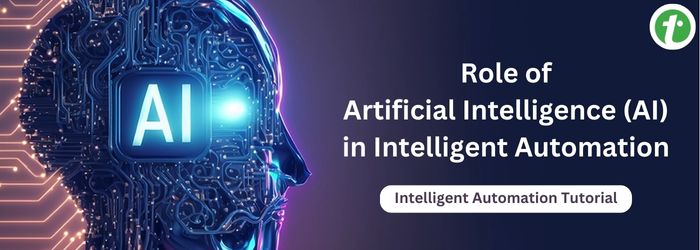
Basically, AI is the heart of intelligent automation, as it makes systems capable to self-learn, adapt to change, and make more informed decisions. Lets move ahead and learn how AI is so important in intelligent automation.
Role of AI in Intelligent Automation
The main function of artificial intelligence (AI) in intelligent automation is to provide cognitive capabilities to handle complex data and tasks, make data-driven decisions, and adapt to changes without any external upgradation. However, AI performs many more important functions in IA to make the automation intelligent.
Some of the key functions of AI in IA are explained below −
- Decision Making − Artificial intelligence allows automation systems to analyze process data, identify relations and patterns in them, and make more informed decision based on this data.
- Handling Unstructured Data − Artificial intelligence also provides abilities to automation systems to handle unstructured data in various formats like text, image, videos, audios, etc. For this purpose, it integrates various sub-domains of AI like natural language processing, computer vision, etc.
- Self-Learning − AI also makes use of machine learning in automation systems to allow them self-learning and improve from past experiences. It enables automation systems to adapt to changes in processes and workflows over time, and enhances accuracy and efficiency of automation systems.
- Process Optimization − Artificial intelligence can accurately analyze huge amounts of process data to identify issues and inefficiency. Hence, AI provides recommendations for process optimization, and allows to make the workflows efficient as much as possible.
- Identifying Possible Areas for Automation − Artificial intelligence continuously monitors the business operations within an organization and provides insights about possible areas of automation.
These are the key functions that AI performs as a part of intelligent automation to make the automation smarter and more efficient.
Key AI Technologies Used in Intelligent Automation
In intelligent automation, various artificial intelligence technologies are used to implement and perform different functionalities. Some of the key AI technology widely employed in intelligent automation are explained here with their core functionality −
- Data Analysis − It is one of the basic AI technologies used in intelligent automation. It provides capabilities to analyze large amounts of process data to identify bottlenecks, inefficiencies, patterns, etc. This AI technology provides valuable insights to make informed decisions and optimize processes.
- Machine Learning − ML is an advanced AI technology that enables automation systems to learn from data and past experiences and improve over time without need for programming externally. This technology enhances the accuracy and efficiency of intelligent automation.
- Natural Language Processing (NLP) − NLP is another modern AI technology used in intelligent automation, and it enables systems to understand and process human languages required for automating tasks and processes.
- Computer Vision − It is an AI technology that provides capabilities to understand and analyze visual data from images or videos and use it for automating processes.
Benefits of AI in Intelligent Automation
AI allows Intelligent Automation to identify inefficiencies and optimize processes and workflows. By providing advanced capabilities like self-learning, adapt to changes, and self-improvement over time, AI offers the following key benefits in intelligent automation −
- AI provides capabilities to automate complex, time-consuming processes, and hence improves operation efficiency of intelligent automation.
- AI enhances the accuracy of intelligent automation by minimizing human errors and dynamic learning.
- AI allows organizations to scale their automation functionalities without making significant changes to meet the growing demands of business.
- AI provides big data analytics capabilities and actionable insights for enhanced decision-making.
Conclusion
Intelligent Automation is an advanced automation technology which simulates intelligence (i.e., artificial intelligence) in business process automation. AI provides cognitive capabilities in process automation to enhance efficiency, productivity and accuracy. It allows automation systems to handle more complex processes and operations.
Let's move to the next chapter in the tutorial and learn about Major Applications of Intelligent Automation in Real-World Industries.
Applications of Intelligent Automation
In business process automation, the primary application of intelligent automation is to automate and streamline workflows and processes, and enhance efficiency, optimize operations, reduce errors, minimize costs, and free up human resources for more strategic tasks.
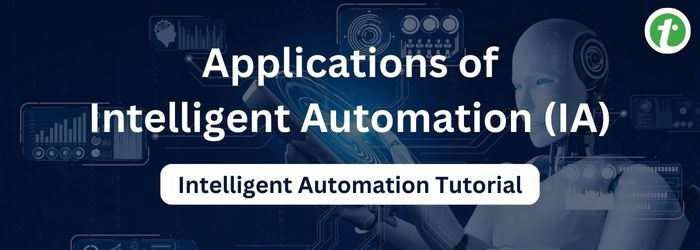
In this chapter, we will learn about some of the key applications of intelligent automation and their real-life examples.
Applications of Intelligent Automation
Some of the major applications of intelligent automation across various industries and business processes are explained below −
Customer Support
Intelligent automation is used in business organizations to automate and enhance customer support services. IA helps improving customer experiences by providing efficient interactions, and personalized and 24/7 support services.
Additionally, it significantly reduces the response times and free up human employees to be engaged in more strategic and complex tasks.
For example, business organizations can implement an AI-powered chatbot to handle and respond to customer queries or inquiries in real-time.
Workflow Automation
In any business organization, repetitive tasks like data entry, report generation, invoice processing, inventory management, etc. consume a significant time of an employee. However, intelligent automation can automate these tasks easily so they can be completed without any human intervention.
Hence, IA frees up employees from low-value repetitive tasks and let them to focus on high-value, complex processes. This results in enhanced productivity in the business operations.
Business Process Management
Business organizations also use intelligent automation to automate, optimize, and manage their business processes and operations. IA allows to minimize errors and reduce process time.
Healthcare
Intelligent automation also plays an important role in healthcare industry, as it allows to improve operational efficiency and patient care. IA provides several advanced capabilities like remote appointment and consultation, automate and speed up diagnosis process, reduces workload on administrative staff, provides accurate data collection facilities, etc.
Document Processing
Most organizations find it quite challenging to manage and process large volumes of documents. But intelligent automation can be used to rectify this issue. IA provides an automated document processing capability to handle these documents. It reduces human errors and time required for processing these documents.
Procure-to-Pay (P2P) Automation
Intelligent automation is also used to end-to-end automate and streamline procurement processes, from sourcing to payments. It can automate most operations related to procurement such as invoice verification and processing, payment approvals, automated follow-ups on due payments, and more. It significantly reduces delays in procurement, and enhances experiences and relationships with vendors.
Quote-to-Cash (Q2C) Process
Intelligent automation is employed for automating processes from initial customer inquiries to final payments. This IA application helps organizations to increasing their revenue by automating order processing and improving customer satisfaction.
In this application, IA performs various functions automatically such as providing personalized quotes, tracking order status, and sending reminders to customers for order placement or making payment.
Customer Relationship Management
CRM (Customer Relationship Management) is another area where intelligent automation plays a critical role in automating routine tasks and analyzing customer interaction data. This application of intelligent automation helps organizations to improve their customer engagement, achieve targets, and enhance sales efficiency.
Quality Management
Intelligent automation is used in manufacturing industries to produce consistent products with assured quality. For this purpose, IA collects and analyzes data from production lines in realtime and identify defects. This application of IA also helps organizations to improve their reliability of product in market and minimize waste.
Conclusion
Intelligent Automation is a key technology behind higher efficiency, accuracy, and reliability in a modern business organization. It allows organizations to automate their simple to complex processes by using AI and RPA. Organizations are also using Intelligent Automation as a tool for reducing time and cost required in their business operations.
Tools for Intelligent Automation
Read this chapter to get an understanding of some of the popular tools for intelligent automation. Intelligent automation tools are nothing but software or technology platforms designed and used to automate, streamline, optimize, and improve workflows and processes within a business organization. These tools basically combine automation functionalities with artificial intelligence.

The primary functions of intelligent automation tools are to automate repetitive, low-value tasks, improve operational efficiency, and reduce costs involved in business operations. Let's have a detailed discussion on some of the key tools widely used for intelligent automation.
Classification of Intelligent Automation Tools
Intelligent automation tools can be broadly classified into the following main categories −
- Enterprise Automation Platforms
- Business Process Management (BPM) Tools
- Workflow Management Software
- Robotic Process Automation (RPA) Tools
- Process Intelligence Tools
- Intelligent Document Processing (IDP) Software
Now, let us discuss each of these categories of intelligent automation tools in detail.
Enterprise Automation Platforms
Enterprise automation platforms provide a wide range of solutions to intelligent automation for automating and streamlining various processes across a business organization. These tools provide an integrated suite of multiple automation functionalities like process automation, workflow optimization, data analytics, etc. Hence, enterprise automation platforms create a complete framework for digitally transforming business operations.
The key functionalities that enterprise automation platforms provide to intelligent automation are as follows −
- End-to-end process automation across different departments within the organization
- Integrates multiple enterprise systems like ERP, CRM, etc.
- Provides data-based insights for improvement, etc.
The following are some popular examples of enterprise automation platforms for intelligent automation −
- UiPath − It is a suite of process automation tools that allows organizations to design workflows, and combine RPA, AI, and document processing to provide enhanced automation capabilities.
- ProcessMaker − It is a suite of business process automation tools that combines AI and NLP, and allows businesses to automate their complex workflows without any coding requirements. It also provides robust dashboard and reporting functionalities.
- Automation Anywhere − It is a global software company known for developing RPA software for business process automation. It provides cognitive automation tools and bots powered by AI and able to mimic human actions and conversations in intelligent automation.
Business Process Management Tools
BPM (Business Process Management) tools are designed and used to integrate intelligent automation in the field of process management. These tools provide capabilities to model, analyze, and optimize processes within a business organization. The primary goal of BPM tools is to enhance operational efficiency, improve regulatory compliance, and provide insights into workflows.
As a part of intelligent automation, the main functions that business process management tools perform include −
- Modelling and visualization of workflows and processes
- Automating processes that involve rule-based decision making
- Providing continuous monitoring of workflows
- Providing insights into processes for re-engineering or optimization, etc.
Some of the popular business process management tools used in intelligent automation are −
- Bizagi − It is a BPM platform that provides process modeling and automation facilities.
- Camunda − It is a process management tool that allows organizations to manage and automate their workflows and processes.
- ARIS − It is a business process management platform developed by Software AG to provide process modeling, process analysis, and process management functionalities.
Workflow Management Software
Workflow management software are intelligent automation tools developed to design and manage task-specific workflows within a business organization. These tools provide capabilities to automate repetitive tasks, improve collaboration among teams, and reduce manual efforts and errors in business operations.
The key functionalities that workflow management software provide in intelligent automation include −
- Provides drag-and-drop interface for workflow design
- Automates and continuously tracks tasks
- Provides seamless integration with third-party applications
- Provides tools for team collaboration, etc.
The following are some popular workflow management software available to use in intelligent automation −
- Com − It is a cloud-based workflow management software that provides functionalities for task management, team collaboration, workflow automation, time tracking, file sharing, etc.
- Kissflow − It is also a workflow management platform that simplifies and streamlines workflow management and improves productivity. It helps organizations to keep their workflows organized.
- Zapier − It is an automation tool that allows organizations to connect their applications with services. It also provides integration capabilities to connect multiple applications to automate repetitive tasks without need for coding.
Process Intelligence Tools
Process intelligence tools are those components of intelligent automation that use data and AI technologies to provide insights into how business processes actually run. These tools also provide information to enhance performance.
Process intelligence tools allows organizations to identify inefficiencies and issues in their business processes and provides insights to improve them.
Hence, the functionalities that process intelligent tools provide in intelligent automation are as follows −
- Provides capabilities for process discovery
- Allows to perform root cause analysis and track the process performance
- Allows to perform predictive analytics
- Provides real-time process optimization through automation, etc.
The following are some popular examples of process intelligence tools for intelligent automation −
- Celonis − It is a popular process intelligence tool that helps organizations to optimize their business processes. It provides necessary functionalities for visualizing processes, identifying inefficiencies, and providing recommendations for improvements.
- Fluxicon Disco − Disco is process mining tool developed by Fluxicon and used by business organizations to perform data mining and optimize processes.
- SAP Signavio − It is also a process intelligence tool that organizations use to visualize and optimize their workflows.
Robotic Process Automation (RPA) Tools
RPA tools are designed and used to automate rule-based, repetitive tasks without human intervention. These tools use software robots to mimic human actions and provide the following key functionalities −
- Allows to automate repetitive tasks with no-code, low-code features
- Provides supports to process structured process data
- Reduces errors and costs involved through automation, etc.
The following are some popular RPA tools used in intelligent automation −
- Microsoft Power Automate − It is an RPA platform designed to automate repetitive tasks and processes.
- Robocorp − Robocorp is an open-source RPA tool used for intelligent automation of repetitive tasks.
- BluePrism − It is also an RPA tool that allows human workers and digital workforces work collaboratively through a combination of RPA and BPM functionalities.
Intelligent Document Processing Software
IDP software is an intelligent automation tool designed to automate document processing tasks. In intelligent automation, this software performs various functions like data extraction, data validation, and data interpretation. By automating document processing, IDP software improves the accuracy and efficiency in these operations.
An IDP software typically performs the following key functions in intelligent automation −
- Extracts data from variety of documents by using OCR
- Performs data classification and validation
- Integrates data with robotic process automation and workflow management tools
- Provides simplified document processing, etc.
Some of the widely used intelligent document processing software are as follows −
- AI − It is one of the popular IDP software used in intelligent automation. Its operation is based on the natural language processing (NLP) for analyzing and processing unstructured documents.
- Antworks CMR+ − It is an IDP software that makes use of AI to extract, organize, and digitalize data from various business documents. It is widely used by healthcare and finance institutions.
- Rossum − It is a cloud-based IDP software used in intelligent automation. Rossum is known for its advanced capabilities such as AI-powered data extraction and integration with business applications.
Conclusion
Intelligent Automation tools are key components behind the digital transformation of business processes and enhanced operational efficiency in business operations. These tools allow organizations to automate and manage their tasks, ranging from business processes to document processing and workflow management.
Let's move to the next chapter in the tutorial and discuss the Key Challenges in Implementation of Intelligent Automation.
Challenges in Intelligent Automation
This chapter is meant for highlighting the most common challenges that business organizations face when implementing Intelligent Automation. Here you will also find some possible solutions to overcome these challenges. The increasing accessibility of artificial intelligence (AI) allows businesses to implement intelligent automation for minimizing errors, enhancing decision-making, and improving productivity in their processes and workflows.
The use of Intelligent Automation also reduces the time and resources required for executing repetitive tasks.
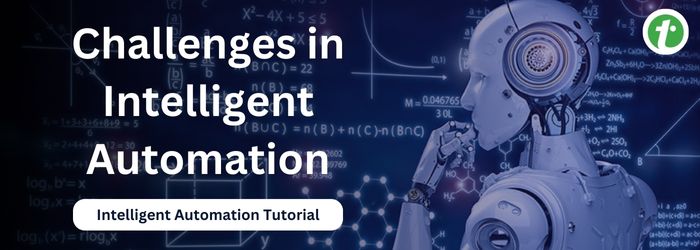
Despite its several benefits, businesses also face multiple challenges along the way of implementing intelligent automation in their organizations. Let's discuss about these challenges in detail.
Common Challenges in Implementing Intelligent Automation
As we know, intelligent automation combines multiple advanced technologies like AI, workflow management, RPA, NLP, etc. to automate processes, enhance efficiency, and reduce time. However, the successful integration of these technologies and implementation of intelligent automation come with its own challenges. Some of the major issues and challenges that organizations face in their way to IA implementation and their possible practical solutions are explained below.
Resistance to Change
It is a basic human nature to oppose to changes, and this resistance to change becomes more intense when it involves the use of technology. This is mainly because human employees in any business organization feel that automation will displace their jobs or require them to learn entirely new things.
However, this challenge can be easily rectified by following below mentioned practices −
- Educating employees about the advantages of intelligent automation
- Providing trainings to employees to understand how to use IA tools and integrate them into their workflows
- Assuring employees that IA is meant to enhance their productivity and not for replacing them.
Integration Challenges
Most business organizations have their manual, legacy systems, and integrating intelligent automation with these existing systems can have compatibility issues. In that case, integration of intelligent automation becomes complicated and may lead to low-quality outcomes.
To overcome this issue, the following can be some practical solutions −
- Create a strategic technology plan
- Determine the systems that require custom integration and that can be integrated with read-made solutions
- Use clean and well-organized data for seamless integration
- Use appropriate integration techniques depending on the system needs, etc.
Data Privacy Concerns
Data is the foundation for intelligent automation, and the increasing data breaches and risks can increase the data privacy concerns for businesses, such as how the system will use and store their sensitive data. Any kind of data breaches can result in complications like legal matters, financial consequences, loss of trust, and more.
Businesses can reduce the risks of facing this challenge by implementing intelligent automation with strict data privacy practices, like as follows −
- Providing clear information about how data is used and stored
- Adhering to regulatory compliance and standards
- Providing extra layers of security to sensitive data, etc.
Unexpected Disruptions in IA Operations
There can be certain unexpected disruptions in intelligent automation processes, such as cyber threats, power outages, etc. These disruptions can affect the entire automation process of business operations.
This issue can be handled by following some practices like −
- Implementing redundancy measures
- Using cloud-based backup systems
- Regular testing and maintenance of IA system
- Implementing IA as per industry standards, etc.
Unrealistic Expectations from IA Systems
Sometimes business organizations expect that intelligent automation can automate their all the processes and solve every operational issue. In actual, intelligent automation is a powerful technology but it is not the solution for everything. Also, it requires continuous improvement to deliver the desired outcomes.
The following can be some practical solutions to overcome this IA related issue −
- Set a clear and achievable goal for intelligent automation
- Continuously improve the processes
- Regularly update the intelligent automation systems
- Understand and achieve the realistic goals, etc.
Conclusion
In this chapter, we highlighted some of the major challenges in implementing Intelligent Automation. However, these challenges can be addressed by following some practices like careful planning, open communication, training employees, and following regulatory standards, etc.